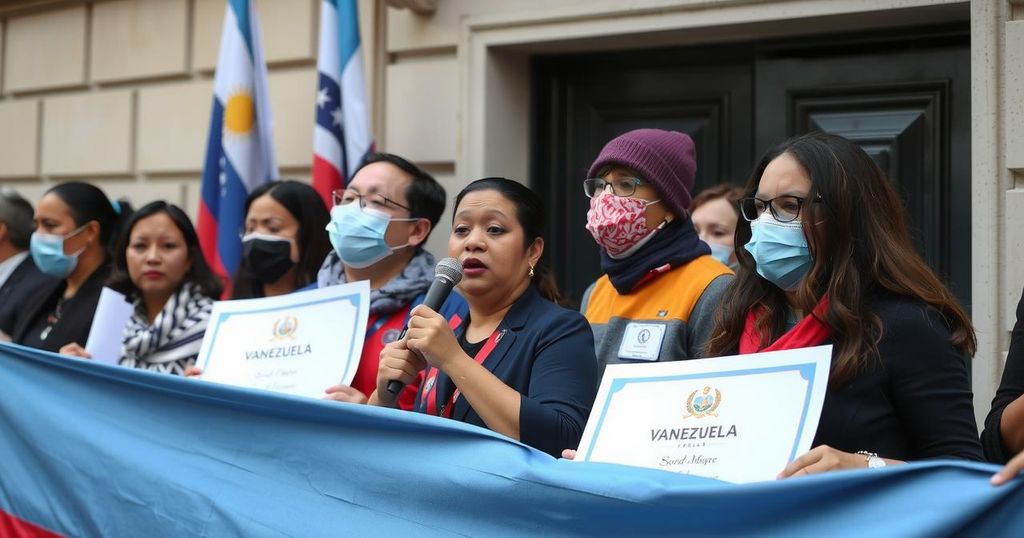Venezuelan opposition members residing at the Argentine Embassy in Caracas report a dire lack of essential services, accusing the government of imposing a siege to capture them. Despite asylum protections bestowed by Argentina, their situation remains precarious, highlighting critical human rights concerns amid the political turmoil in Venezuela. The Organization of American States has condemned these actions as a violation of diplomatic norms and an imminent threat to those involved.
On Saturday, Magalli Meda, a prominent Venezuelan activist, reported that the Argentine Embassy in Caracas had been deprived of electricity for a staggering 35 days, resulting in severe conditions for six opposition members seeking refuge there. She referred to the embassy as a ‘prison embassy,’ emphasizing the detrimental impact on human rights in the vicinity. While Venezuelan President Nicolás Maduro and opposition candidate Edmundo González proclaimed victories in the recent presidential elections, the international community remains vigilant regarding the dire predicament of the asylum seekers.
Following the contested elections, wherein Nicolás Maduro was declared the victor by electoral authorities, Edmundo González encountered legal troubles, leading to an arrest warrant issued against him in September. Afterward, González fled to Spain, having acquired safe passage through negotiations between Venezuela and Spain. In contrast, the situation of the six opposition members has been dire, as the Venezuelan government has obstructed their departure from the Argentine Embassy, despite asylee protections extended by Argentina.
Fernando Martínez Mottola, one of the opposition figures, recently exited the embassy, triggering allegations that Venezuelan security forces have been enforcing a siege around the embassy to detain him and others. González characterized the situation as a ‘permanent’ siege, raising alarms regarding the safety of the individuals involved. The General Secretariat of the Organization of American States (OAS) publicly denounced this siege, stating that the intimidating presence of armed personnel threat to the lives of those seeking asylum, compounded by disruptions in basic necessities such as power, water, and food.
The OAS emphasized that the issuance of safe-conduct passes for these asylum seekers is not only critical but an immediate obligation. Citing the Vienna Convention on Diplomatic Relations, it reiterated the receiving State’s duty to support the performance of mission functions and underscored that asylum should be afforded in urgent cases to ensure the safety and protection of individuals fleeing persecution.
Overall, the ongoing challenges faced by Venezuelan opposition members underscore the pressing nature of their plight and the international community’s responsibility to intervene against acts that violate human dignity and safety.
The ongoing political crisis in Venezuela has been marked by severe human rights violations, particularly against opposition figures. The government of Nicolás Maduro has faced extensive accusations of authoritarianism, especially following disputed presidential elections. The asylum seekers at the Argentine Embassy represent the larger struggle for political freedom in Venezuela, further complicated by risks to their personal safety from government forces. Amidst this turmoil, international diplomatic conventions play a vital role in ensuring the protection of asylum seekers, underscoring the obligations of host states.
The situation of Venezuelan opposition members seeking asylum at the Argentine Embassy exemplifies the alarming human rights crisis in Venezuela, highlighting the urgent need for international intervention. The accusations of a government-enforced siege and the systematic deprivation of essential services within the embassy reflect the lengths to which the Maduro regime is reportedly willing to go to suppress dissent. Amidst these developments, adherence to international laws concerning diplomatic asylum becomes essential in ensuring the safety of opposition members fleeing persecution.
Original Source: www.jurist.org






